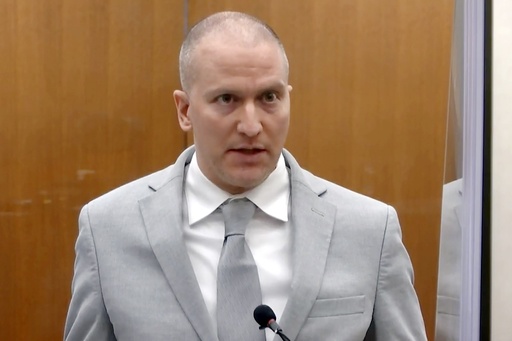A judge has approved a request from Derek Chauvin’s legal team to conduct examinations on samples from George Floyd as part of Chauvin’s attempt to overturn his federal civil rights conviction linked to Floyd’s death in 2020.
U.S. District Judge Paul Magnuson issued the order on Monday, allowing the defense to analyze Floyd’s heart tissue and fluid samples to support a theory that his demise resulted not from asphyxiation — as prosecutors assert, caused by Chauvin pressing his knee on Floyd’s neck for over nine minutes — but from a pre-existing heart condition possibly worsened by a rare tumor.
Floyd’s death ignited global protests, with some escalating to violence, prompting a significant national dialogue regarding police brutality and systemic racism.
In 2021, Chauvin received a conviction for murder in state court, followed by a guilty plea later that year in federal court for violating Floyd’s civil rights. Chauvin’s appellate attorney, Robert Meyers, contends that the previous defense attorney, Eric Nelson, failed to inform Chauvin of an external pathologist, Dr. William Schaetzel from Topeka, Kansas, who had reached out to Nelson before Chauvin’s plea, proposing an unsolicited theory that Chauvin was not responsible for Floyd’s death.
Chauvin argues that this inadequate legal representation led to ineffective counsel and is pushing for a new trial, stating that he would not have pleaded guilty had he been aware of the pathologist’s opinions.
Conversely, federal prosecutors have maintained in court documents that Nelson made a logical “tactical decision” not to pursue the unverified opinion from someone claiming to be an expert. They noted that Nelson had sought advice from other medical professionals when preparing for Chauvin’s cases, including one who offered testimony during the state trial, from which the jury ultimately dismissed Chauvin’s medical defense. The prosecutors emphasized that proving ineffective counsel is extremely challenging.
Nelson opted not to comment on the matter as of Tuesday.
Currently, Chauvin is serving his federal civil rights sentence of 20 years and state murder sentence of 22.5 years simultaneously at a federal facility in Texas. The U.S. Supreme Court declined to hear his appeal regarding the murder conviction last year.




